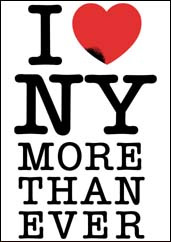The Great Blackout of Aught-Three, as experienced by me:
- Frankly, I enjoyed it. I have many blessings to count, I realize I live within a feasible walking distance from home, I was wearing comfortable shoes, the iPod was fully charged and loaded (and it also makes an excellent source of light in a darkened emergency stairwell), my apartment’s not that stuffy so I had a much easier time of it than a lot of other people. Still, it was a nice enough day and it was pretty interesting to see what was going on during the hike uptown and over the bridge. I have to admit that at times I had to stop myself from breaking into song along with the iPod, because I was so nonplussed about the whole experience, and I was finding so pleasant to just walk and watch people and stuff.
 Of course, it all would have been so much worse if the rest of the city hadn’t been so laid back about it all. Compared to that other time, no one was was freaking out that I could see. We calmly climbed down the 20 stories to the street, where people were hanging out talking to others, deciding what to do. Walking up Lexington Avenue toward the Queensboro Bridge, people were waiting calmly on lines at pay phones, delis, and ice cream trucks, and the only ones being assholes were the fat-cats sealed up in their SUVs who were pissed off that they didn’t have the right of way anymore. And for once, no one was greeting their hostility with more hostility. People were just rolling their eyes at the temper tantrums. Every truck driver with extra room was telling people to hop on, and at the bridge there was a human chain lifting others onto the upper roadway for the trudge home.
Of course, it all would have been so much worse if the rest of the city hadn’t been so laid back about it all. Compared to that other time, no one was was freaking out that I could see. We calmly climbed down the 20 stories to the street, where people were hanging out talking to others, deciding what to do. Walking up Lexington Avenue toward the Queensboro Bridge, people were waiting calmly on lines at pay phones, delis, and ice cream trucks, and the only ones being assholes were the fat-cats sealed up in their SUVs who were pissed off that they didn’t have the right of way anymore. And for once, no one was greeting their hostility with more hostility. People were just rolling their eyes at the temper tantrums. Every truck driver with extra room was telling people to hop on, and at the bridge there was a human chain lifting others onto the upper roadway for the trudge home.- If I had to be stuck in a major city during a massive power blackout, I’m sure as hell glad it was this one. New York’s active street-level culture is normally a plus from a social standpoint, but it’s also useful in a crisis. It’s a pedestrian city, so if you’re forced to hike across it, there is no shortage of places to get water, food, or alcohol. There are lots of payphones, in case the cellular networks are down or overloaded. People are used to regular contact with strangers, so it’s not a big deal to interact with your neighbors or other people on the street. It becomes much more of a shared event.
- I’m very grateful that delis and greengrocers stayed open long enough to let people stock up on provisions for the night. All we had at home was a half-gallon of milk and some wheat bread, so I was lucky to grab some fruit to snack on during the night.
- Even with my rose-tinted view of life in New York, I was amazed at the lack of street crime and looting, especially after living through the blackout of ’77, and then later living in the middle of the neighborhood (Bushwick) where most of the looting and the fires took place. I guess it was part of the relief that this was just a blackout. Also, I have to give our charisma-free mayor some credit for telling everyone the power would be back by midnight last night. By letting everyone think it would get back to normal soon, those announcements probably prevented a lot of mayhem during the night.
- I’d always believed the party line about this problem being solved after ’77, but I guess a certain vulnerability is the nature of any interconnected system. Even if safeguards had been put in place since ’77, I suspect that power usage has increased enough to leave us back in the same position. Bush is already yapping on about how the system needs to be modernized, but I bet he’s thinking along the lines of lucrative contracts to his pals in the petrochemical and other traditional power industries. I’m thinking more about the sensibility of alternative power sources, especially fuel-cell networks that would allow cars to dump excess fuell-cell power back into the grid, rather than letting it burn off while the car is idle.
